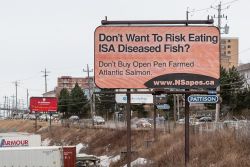Halifax Media Co-op
News from Nova Scotia's Grassroots
Nova Scotia’s Eastern Shore Launches a New Billboard Campaign in Halifax
In the wake of news that ISA-diseased farmed salmon is being processed for human consumption, Eastern Shore residents have launched a bold new billboard campaign designed to educate consumers about the possible health risks associated with eating open pen farmed salmon.
APES’ President, Dr. Marike Finlay, reports that the group decided to launch their billboard campaign when, in January 2013 the Canadian Food Inspection Agency (CFIA) cleared Cooke Aquaculture to process fish with Infectious Salmon Anemia (ISA) for human consumption, “despite the fact that this is an internationally reportable disease that has required the wholesale destruction of the fish in every other jurisdiction.”
Cooke Aquaculture has confirmed that it would not be separating or otherwise marking fish from the disease site at the consumer sale end.
“If this is true,” says Dr. Finlay, “we do not see how a consumer could determine whether the Atlantic salmon filets they buy in the store have been contaminated by the disease or not. We think people should know this. It’s the only way they can have a choice about it.”
APES’ members are concerned that there have been nine recorded outbreaks of ISA in the Maritimes in the last 18 months, and four new viral strains. Patricia Ouellette, an officer with the Canadian Food Inspection Agency, told the CBC in a recent report that the CFIA has “shifted gears to preventing the spread of the disease and no longer considers eradication an option.”
“It’s in the water now,” says Bill Williams, Vice-President of APES. “We think that’s why the CFIA changed its policy, and is now letting companies grow out and harvest ISA-infected fish for human consumption because they say it’s not harmful to humans. But ISA also endangers the wild fish that swim by those pens, the herring, which is an important commercial fish, and the recovering wild salmon and cod stocks. Now why in the world would we want to feed our kids sick fish and endanger our wild stocks? Neither one makes sense.”
Dr. Alexandra Morton, a marine biologist who gave the Ransom A. Meyers lecture at Dalhousie University in 2012, has argued that “it’s probably not a good idea” to eat ISA infected salmon. According to Dr. Morton, “ISA is an influenza-type virus, and influenza-type viruses can mutate in unpredictable ways. We know that pathogens are becoming more virulent all the time; I believe events like this really can risk human health safety.”
-30-
Press contact: Marike Finlay 902 654-2265 marike.finlay@gmail.com
Press release written by Karin Cope karin.cope@gmail.com
Articles referenced in this release:
http://www.cbc.ca/news/canada/nova-scotia/story/2013/01/19/nb-quarantined-salmon.html
The site for the Halifax local of The Media Co-op has been archived and will no longer be updated. Please visit the main Media Co-op website to learn more about the organization.



